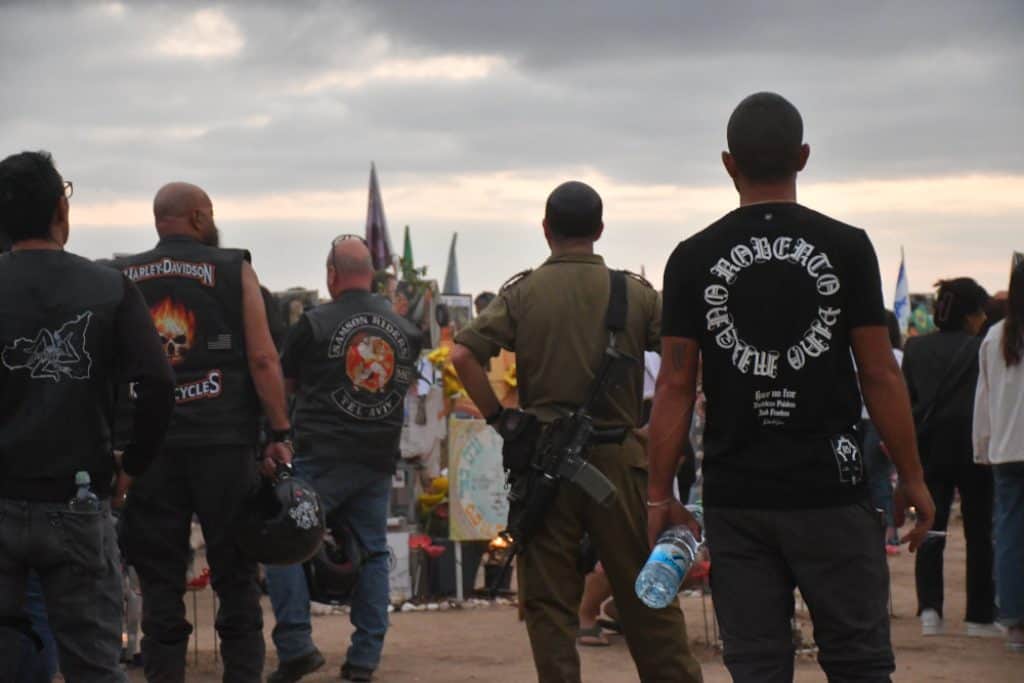
Israel commemorated the anniversary of the Hamas attack on Israel on October 7, remembering the 1,200 people killed in the attack as well as more than 100 hostages still held in Gaza. The anniversary was marked by rocket fire toward Israel from Gaza, Lebanon, and Yemen, a stark reminder that Israel is involved in a complex, multi-front war. In addition, the country faced several drone threats that likely originated in Iraq.
The rocket fire by Hezbollah began in the early hours of the morning before sunrise. At 5:15 am, sirens sounded in Rishon LeTsiyon and Palmachim, south of Tel Aviv. Palmachim is next to an IDF military base. The IDF said there was a drone infiltration and that the Israeli Air Force “intercepted two suspicious aerial targets that were launched from the east.” The IDF did not elaborate further on the type of drones or where they originated. However, when the IDF says “east,” it usually means threats from Iraq, which have increased in recent weeks. In addition, the Houthis in Yemen launched a surface-to-surface missile at Israel on the afternoon of October 7.
Israelis began to gather early in the morning to commemorate the October 7 attacks. The 2023 attacks began at 6:29 am, and people wanted to commemorate them as they originally unfolded. At the site of the Nova Music Festival, hundreds of individuals gathered in a field near Gaza where Hamas had killed several hundred Israelis the year prior.
Hamas, which continues to see the attack as a victory over Israel, launched four rockets from Gaza at 6:31 am to mark the anniversary. Iranian state media, which backs the terrorist group, claimed Hamas launched a “massive attack on Israeli bases.” There was no evidence to back up this exaggerated claim, though Hamas did fire several salvos of rockets throughout the day, some of which reached central Israel.
The IDF struck the sources of the Hamas rocket fire in the southern Gaza city of Khan Younis. “As we mark one year since the October 7th Massacre, the Hamas terrorist organization continues its relentless attempts to carry out terrorist attacks against Israeli civilians,” the IDF said. In recent months, Hamas has sought to reconstitute itself in Khan Younis and northern Gaza. The IDF launched a new operation in Jabaliya on the evening of October 5 and has called on Gazans in Arabic social media posts to evacuate several areas in Khan Younis and northern Gaza.
As the IDF was carrying out strikes in Gaza, the Israeli Air Force struck 120 targets in southern Lebanon in a large air raid. “These targets belonged to different units of the Hezbollah terrorist organization, including regional units of Hezbollah’s Southern Front, the Radwan Forces, the Missiles and Rockets Force, and the Intelligence Directorate,” the IDF said. This operation came as Hezbollah launched at least 135 rockets at Israel on October 7. Rockets fell throughout northern Israel and reached longer-range targets near Haifa.
While Israelis were focused on commemorating the anniversary of Hamas’s attack, the IDF contends with numerous threats and manages an increasingly complex multi-front war. For instance, the IDF now has three divisions operating in Lebanon. The 98th Division led the way on October 1, followed by the 36th days later. Now, the IDF says the 91st Division is also carrying out limited activity in Lebanon. The 91st Division is responsible for defending the border with Lebanon, so its inclusion in the operation was expected.
On the evening of October 7, the IDF also announced that it was creating a closed military zone in another part of the border, extending closures that affected the eastern and central portions of the border. This appears to dovetail with the expansion of operations in Lebanon.
Israel also continues to be on a war footing for a possible response to the Iranian ballistic missile attack on October 1. US Central Command head General Michael ‘Erik’ Kurilla met with IDF Chief of Staff Lieutenant General Herzi Halevi on October 6. “General Kurilla’s visit focused on the current security issues, with an emphasis on Iran and the northern front,” the IDF said. Israel has coordinated closely with the US throughout the war.







